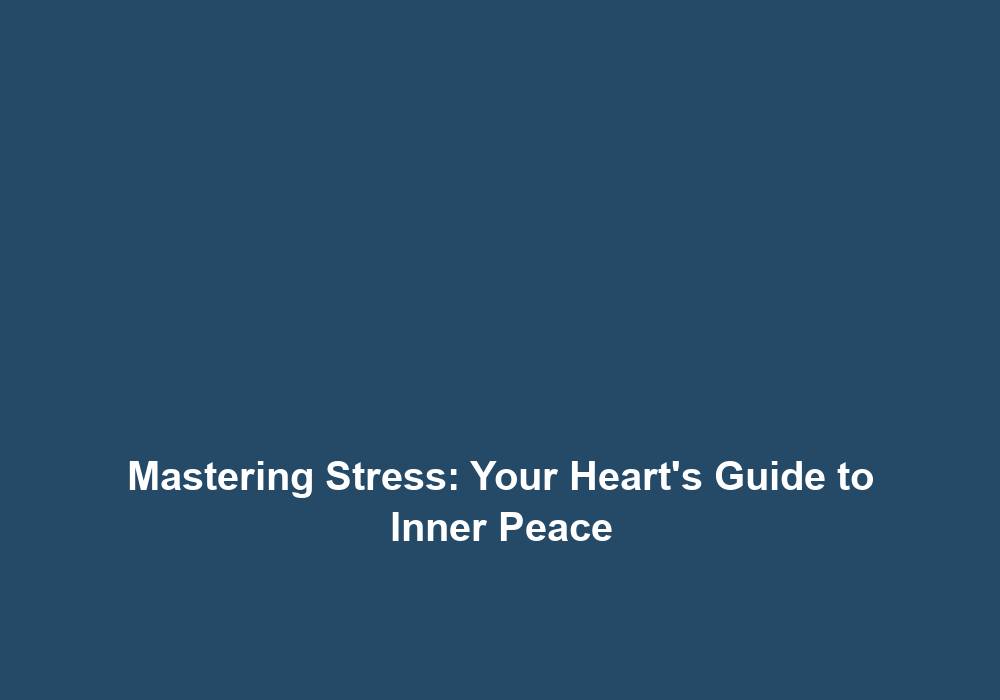Mastering Stress: Your Heart’s Guide to Inner Peace
In today’s fast-paced world, stress has become a common affliction that affects individuals’ physical, mental, and emotional well-being. People from all walks of life experience stress in various forms, whether it be due to work pressures, personal relationships, financial challenges, or health concerns. However, it is important to understand that stress is not an insurmountable obstacle; it can be managed and even transformed into a catalyst for personal growth and inner peace. In this article, we will explore effective strategies and techniques to help you master stress and find harmony in your life.
Understanding Stress and Its Impact on Your Health
Before delving into stress management techniques, it is crucial to understand what stress is and how it affects your overall health. Stress is a natural response that helps the body cope with challenging situations. When faced with a stressful event, your body releases stress hormones, such as cortisol and adrenaline, which prepare you for fight or flight. While short-term stress can be beneficial, chronic stress can have detrimental effects on your well-being.
Prolonged exposure to stress hormones can lead to a weakened immune system, increased risk of cardiovascular diseases, and mental health issues, including anxiety and depression. It is, therefore, essential to address stress effectively and develop coping mechanisms that promote inner peace and well-being.
The Physical Effects of Stress
Stress can manifest in various physical symptoms. These may include headaches, muscle tension, fatigue, digestive issues, and even a compromised immune system. The release of stress hormones can put a strain on your body, leading to long-term health problems if not properly managed. Understanding the physical impact of stress can motivate you to take proactive steps to alleviate it.
The Mental and Emotional Effects of Stress
Stress not only affects your physical health but also takes a toll on your mental and emotional well-being. Chronic stress can lead to anxiety, irritability, mood swings, and difficulty concentrating. It can also contribute to the development or exacerbation of mental health disorders such as depression or post-traumatic stress disorder (PTSD). Recognizing the mental and emotional effects of stress is crucial in order to seek appropriate support and implement effective stress management strategies.
The Importance of Stress Management
Given the negative impact stress can have on your health, it is vital to prioritize stress management. By addressing stress head-on and implementing strategies to minimize its effects, you can significantly improve your overall well-being. Stress management techniques not only help in reducing stress levels but can also enhance your ability to cope with challenges and maintain a sense of inner peace.
Identifying Your Stress Triggers
To effectively manage stress, it is important to identify the specific triggers that cause stress in your life. Each individual’s stress triggers may vary, but common factors include work-related pressures, financial instability, relationship conflicts, health issues, and overwhelming responsibilities. By pinpointing the root causes of stress, you can develop targeted strategies to address them and regain a sense of balance and tranquility.
Work-Related Stress Triggers
Work-related stress is a common source of stress for many individuals. It can stem from factors such as excessive workload, tight deadlines, conflicts with colleagues, or a lack of job satisfaction. Understanding the specific aspects of your work that contribute to stress can help you devise strategies to manage and alleviate it. This may involve setting boundaries, practicing time management techniques, seeking support from colleagues or supervisors, or exploring career options that align better with your passions and values.
Financial Stress Triggers
Financial challenges can be a significant source of stress for individuals and families. Concerns about debt, job security, or meeting financial obligations can create a constant state of anxiety. To address financial stress, it is important to assess your financial situation, create a budget, and explore strategies to reduce expenses or increase income. Seeking support from financial advisors or counselors can also provide valuable guidance in managing financial stress.
Relationship Stress Triggers
Difficulties in personal relationships, whether with a partner, family members, or friends, can contribute to significant stress. Communication issues, conflicts, or a lack of support can strain these relationships and impact your overall well-being. Seeking professional help, such as couples therapy or family counseling, can provide tools and strategies to improve communication, resolve conflicts, and strengthen relationships. Additionally, setting boundaries and engaging in self-care can help in managing the stress associated with challenging relationships.
Health-Related Stress Triggers
Health concerns, whether acute or chronic, can be a major source of stress. Dealing with a diagnosis, managing symptoms, or undergoing medical treatments can take a toll on your emotional well-being. It is important to seek support from healthcare professionals, join support groups, or engage in activities that promote relaxation and self-care. Taking an active role in managing your health and seeking emotional support can help alleviate stress and improve your overall well-being.
Overwhelming Responsibilities Stress Triggers
Juggling multiple responsibilities, such as work, family, and personal commitments, can lead to overwhelming stress. Feeling constantly overwhelmed and stretched thin can negatively impact your physical and mental health. To manage this type of stress, it is crucial to prioritize tasks, delegate responsibilities when possible, and practice effective time management techniques. Setting realistic goals, practicing self-care, and seeking support from loved ones can also help in navigating overwhelming responsibilities.
Cultivating Mindfulness and Meditation Practices
Mindfulness and meditation have long been recognized as powerful tools in managing stress and promoting inner peace. Mindfulness involves being fully present in the moment, observing your thoughts and emotions without judgment. This practice allows you to detach from stress-inducing thoughts and cultivate a greater sense of calm and clarity.
Meditation, on the other hand, involves focusing your attention and eliminating the stream of thoughts that may be causing stress. By dedicating a few minutes each day to meditation, you can train your mind to become more resilient and better equipped to deal with stressful situations. Both mindfulness and meditation practices have been shown to reduce stress levels, improve cognitive function, and enhance emotional well-being.
The Benefits of Mindfulness
Practicing mindfulness can have a profound impact on your overall well-being. By intentionally focusing on the present moment, you can break free from the cycle of stress and worry. Mindfulness promotes self-awareness, allowing you to recognize stress triggers and respond to them in a more constructive manner. It can also improve your ability to regulate emotions, enhance concentration, and foster a greater sense of compassion towards yourself and others.
The Power of Meditation
Meditation is a powerful practice that can help quiet the mind and cultivate inner peace. By incorporating meditation into your daily routine, you can create a space for relaxation and reflection. Regular meditation can reduce anxiety, improve stress resilience, and promote a sense of inner calm. It allows you to step away from the chaos of daily life and reconnect with your inner self, fostering a deep sense of peace and well-being.
Incorporating Mindfulness and Meditation Into Your Life
To incorporate mindfulness and meditation into your daily life, start by setting aside a few minutes each day for these practices. Find a quiet space where you can sit comfortably and focus your attention on your breath or a specific object. Allow thoughts to come and go without judgment, gently redirecting your focus back to the present moment. Over time, with consistent practice, you will cultivate a greater sense of mindfulness and experience the transformative power of meditation.
Prioritizing Self-Care and Relaxation Techniques
In the midst of a busy and demanding lifestyle, it is essential to prioritize self-care and incorporate relaxation techniques into your daily routine. Engaging in activities that bring you joy and relaxation, such as taking a bath, reading a book, practicing yoga, or spending time in nature, can help alleviate stress and rejuvenate your mind and body.
The Importance of Self-Care
Self-care involves taking deliberate actions to nurture your physical, mental, and emotional well-being. It is not a luxury but a necessity for maintaining balance and inner peace. Prioritizing self-care allows you to recharge and refuel, making you better equipped to handle the demands of daily life. It can include activities such as practicing good sleep hygiene, engaging in regular exercise, eating a nourishing diet, pursuing hobbies, or spending quality time with loved ones.
Relaxation Techniques for Stress Relief
Incorporating relaxation techniques into your daily routine can provide relief from stress and promote a sense of calm. Deep breathing exercises, for example, can help activate the body’s relaxation response and reduce stress levels. Progressive muscle relaxation involves tensing and releasing different muscle groups to release tension and promote relaxation. Guided imagery, on the other hand, utilizes visualization techniques to create a peaceful and calming mental imagery. Experiment with different relaxation techniques to find what works best for you and incorporate them into your self-care routine.
Creating a Self-Care Routine
To prioritize self-care, it is important to create a routine that allows for regular rejuvenation and relaxation. Set aside dedicated time each day or week for activities that promote self-care. This can include allocating time for exercise, practicing mindfulness or meditation, engaging in creative outlets, or enjoying hobbies that bring you joy. By making self-care a priority, you are nurturing your well-being and creating a solid foundation for inner peace.
Seeking Social Support
Social support plays a crucial role in managing stress and fostering a sense of inner peace. Connecting with loved ones, friends, or support groups can provide a valuable outlet for sharing your thoughts, emotions, and concerns. Engaging in meaningful conversations, seeking advice, or simply having someone to listen can significantly reduce stress levels and provide a fresh perspective on challenging situations.
The Power of Connection
Human beings are social creatures, and establishing meaningful connections with others is vital for our well-being. Sharing your experiences, thoughts, and emotions with trusted individuals can provide a sense of validation and support. It can also remind you that you are not alone in your struggles and that there are people who care about your well-being. Cultivating and nurturing these connections can create a sense of belonging and reassurance during times of stress.
Building a Supportive Network
Surrounding yourself with a supportive network of individuals who uplift and encourage you can provide a sense of belonging and reassurance during times of stress. Seek out like-minded individuals who share similar interests or values and engage in activities or groups where you can connect with them. Building a support system can involve reaching out to friends, family members, or joining support groups or communities focused on stress management or personal growth. By nurturing these relationships, you can enhance your overall well-being and create a support system that promotes inner peace.
Seeking Professional Support
In some cases, seeking professional support from therapists, counselors, or coaches may be beneficial in managing stress and finding inner peace. These professionals can provide guidance, tools, and strategies tailored to your specific needs. They can help you explore and address underlying issues contributing to stress and assist you in developing effective coping mechanisms. Seeking professional support is a proactive step towards achieving greater well-being and finding the inner peace you deserve.
Embracing a Healthy Lifestyle
A healthy lifestyle forms the foundation for stress management and inner peace. A balanced diet, regular physical activity, and adequate sleep are fundamental in maintaining optimal physical and mental well-being. Proper nutrition provides the necessary nutrients for your body to function efficiently, while exercise releases endorphins, the body’s natural mood boosters.
The Power of Nutrition
Eating a balanced diet rich in nutrients is essential for managing stress and promoting overall well-being. Incorporate a variety of fruits, vegetables, whole grains, lean proteins, and healthy fats into your meals. Avoid excessive consumption of processed foods, sugary snacks, and caffeinated beverages, as they can negatively impact your mood and energy levels. Prioritize hydration by drinking an adequate amount of water throughout the day, as dehydration can contribute to increased stress and fatigue.
The Benefits of Physical Activity
Regular physical activity is a powerful stress management tool. Engaging in exercise releases endorphins, which are natural mood elevators. Aim for at least 30 minutes of moderate-intensity exercise most days of the week. This can include activities such as brisk walking, jogging, cycling, swimming, or participating in a fitness class. Find activities that you enjoy and make them a regular part of your routine. Not only will physical activity reduce stress levels, but it will also improve your overall physical fitness and enhance your overall well-being.
The Importance of Quality Sleep
Quality sleep is essential for stress management and overall health. Lack of sleep can contribute to increased stress levels, decreased cognitive function, and diminished resilience when faced with challenging situations. Establish a relaxing bedtime routine and create a sleep-friendly environment by keeping your bedroom dark, cool, and quiet. Avoid electronic devices before bed, as the blue light emitted can interfere with sleep. Aim for seven to nine hours of sleep per night to allow your body and mind to rejuvenate and restore.
Conclusion
Mastering stress and finding inner peace is an ongoing journey that requires self-awareness, commitment, and practice. By understanding stress, identifying your triggers, and implementing effective stress management techniques, you can take control of your well-being and transform stress into an opportunity for personal growth.
Remember to prioritize self-care, cultivate mindfulness and meditation practices, seek social support, and embrace a healthy lifestyle. These strategies will empower you to navigate life’s challenges with resilience and find the inner peace that you deserve.







